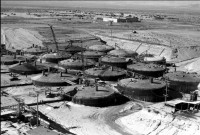Hanford Leaks Pose Long-Term Threat to Communities, Environment
After announcing last week that six tanks were leaking highly radioactive waste into the ground out of aging single-shelled tanks, the U.S. Department of Energy (DOE) now acknowledges the possibility that more tanks may be failing. Up to 14 more tanks have been identified as missing liquid, reveals an Oregonian article. This admission by DOE adds urgency to the effort to resolve design flaws in the Waste Treatment Plant, and the leaks have prompted the Governors of Oregon and Washington to call for the construction of additional tanks to stabilize the waste.
Once released into Hanford's soils, the radioactive pollution will slowly move into Hanford's groundwater, and from groundwater into the Columbia River unless DOE undertakes an aggressive, comprehensive cleanup of the contamination. Riverkeeper will continue to urge all of the responsible agencies - Washington Department of Ecology, DOE, and EPA - to prevent these leaks and clean up dangerous waste at Hanford. The cost of allowing leaks to continue will exacerbate risks for future generations living near the Columbia River.
Read Riverkeeper Brett's Letter to the Editor, printed in The Columbian (March 6, 2013):
Letter: Demand Congress fix Hanford now
The Columbian Feb. 26 editorial, "Congress, fix Hanford," suggested "there could easily come the day when everyone wishes a more expeditious plan had been enacted" to clean Hanford.
As executive director of Columbia Riverkeeper, I think today is that day. Hanford's underground storage tanks have already leaked more than 1 million gallons of nuclear waste into the ground, contaminating groundwater and threatening the Columbia River.
What else needs to go awry at Hanford before we demand independent oversight of Hanford's cleanup and implementation of a more diligent cleanup plan that protects public health and the Columbia River from Department of Energy's damaging mishaps?
The Washington Department of Ecology and the U.S. Environmental Protection Agency must play a more aggressive role in monitoring the DOE.
On top of that, it is time for serious structural changes in Hanford oversight: Congress should create an independent board that will enforce the law, not just complain about the failures, demand accountability and answers, root out corruption and complacency, demand progress, and refuse to accept excuses. I applaud our Washington and Oregon senators, as well as Gov. Jay Inslee, for asking the right questions. But today we need action to ensure independent, long-term oversight of Hanford's cleanup.
Brett VandenHeuvel Hood River, Ore



